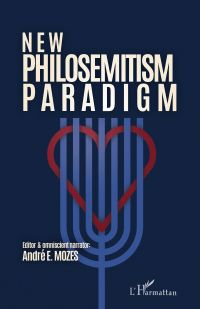New philosemitism paradigm
Éditeur : Harmattan
ISBN numérique PDF: 9782140273773
Parution : 2023
Catégorisation :
Livres numériques /
Autre /
Autre /
Autre.
Formats disponibles
| Format | Qté. disp. | Prix* | Commander |
|---|---|---|---|
| Numérique PDF Protection filigrane*** |
Illimité | Prix : 33,57 $ |
*Les prix sont en dollars canadien. Taxes et frais de livraison en sus.
***Ce produit est protégé en vertu des droits d'auteurs.
Description
The relationship between Jews and non-Jews is one of humankind’s most complex encounters and oldest conflicts. André E. Mozes builds his ground-breaking concept, the New Philosemitism Paradigm, for solving – or at least easing – this conflict, and does this with visionary creativity, historical and scholarly thoroughness and engineering precision. Frequently also with quite a bit of wit, refreshing for such a somber subject. The New Philosemitism Paradigm declares that, while dignified Holocaust remembrance and uncompromising vigilance in front of Antisemitism – and other forms of racism – remain imperative, we need more searching, publicizing and fostering all past and present good co-existence too; interest in each other, co-operation, mutual inspiration and friendship between Gentiles and Jews, of material and spiritual nature. This balanced approach, Mozes suggests, will improve the life of Jews and non-Jews alike, both together and each side separately; and make Holocaust remembrance and education against Antisemitism more effective, easier to teach and to learn. This book is about the better periods of co-existence (not ignoring the horrifying chapter of the Shoah, but presenting also heroic life-savings – more than we are usually aware of); about the Jews themselves, and life with them as seen in classical literature. Finally, it offers a colourful bouquet of varied contemporary pieces: a dozen of Mozes’ own writings, and others written for this volume by invited renowned writers, scholars and independent thinkers of all walks of life.























